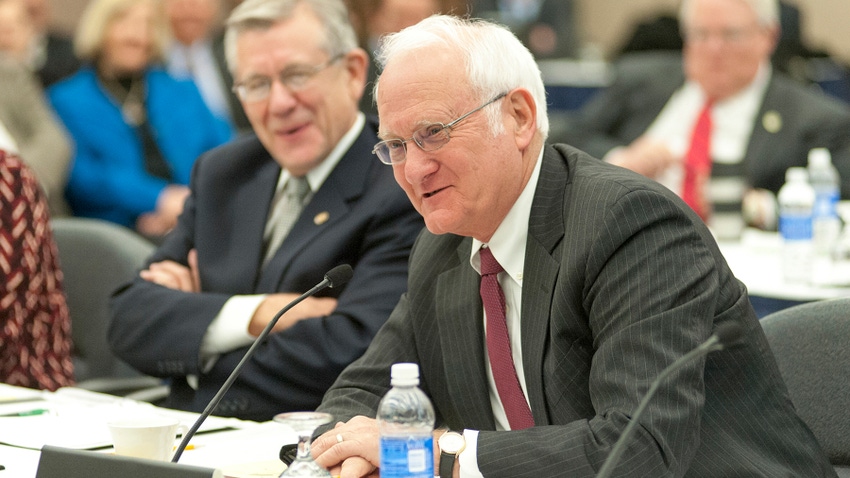
Mention University of Illinois leadership over the past decade, and there’s a name that surfaces in nearly every conversation, as heads nod in respect: Robert A. Easter.
Bob Easter is a renowned animal scientist who spent his career studying pigs, but he’s also a leader people want to follow. That means he steadily moved up the ranks in the agriculture college, then came out of retirement not once, but twice, to lead the land-grant university as interim provost, interim chancellor and then president.
It’s a long way from where he started, on a pig farm down in Texas.
“I have a picture of me at about 12 years old. I’m out in the hog lot in southwest Texas, close to the border with Mexico, kneeling down with a pig,” Bob recalls. “I’ve got on a hat, the boots — I’m a real cowboy. And I think if I could just tell that kid what’s going to happen to him, he would be scared to death.”
In the years since, Bob has fearlessly pioneered swine research and university leadership by listening and learning — which is exactly why Prairie Farmer has named him an Honorary Master Farmer.
Bob grew up on a farm west of San Antonio. His grandfather moved the family there from their successful hog farm near Independence, Mo., in the early 1900s, following promises that it would be the next central valley of California.
“The only thing I could ever figure, it must have been a hard winter in Missouri,” Bob says, laughing. By the 1960s, the water was all but gone. “It was a desert. Dad said to me, ‘You’ve got to get an education and get out of here.’” So he did.
He earned a degree in ag education from Texas A&M, where a professor encouraged him to do graduate work in swine nutrition. He finished his master’s and came to Illinois for his doctorate. When he finished, he had two job offers: one at Illinois and one at Texas A&M.
“It was pretty clear that if I was going to work in the swine industry, I needed to be where that industry was, and not in cattle country,” Bob says. “It turned out to be an incredibly fortunate opportunity for me to be at the University of Illinois.”
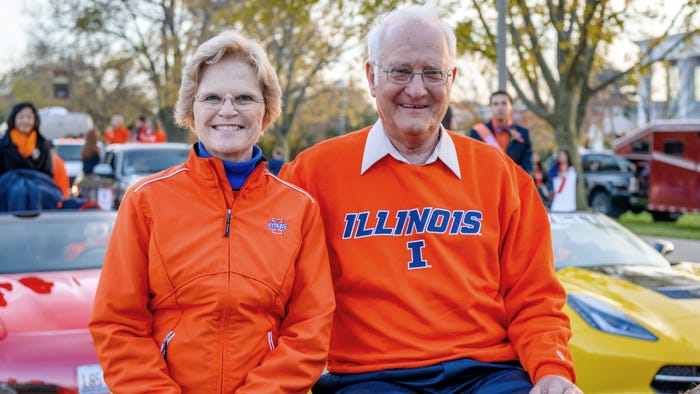
PARTNERS: Cheryl and Bob Easter have celebrated more than a half century of marriage, including a spin or two in a convertible — like this one during the 2014 U of I homecoming parade. (Photo by Craig Pessman)
Natural leader
When asked if he’s always been a leader, Bob supposes so: He was class president for four years in high school, student body president at his community college and in the student senate at Texas A&M. And he was a Texas FFA state officer.
He believes putting young people in leadership roles early on impacts them for life. And small towns offer big leadership lessons.
“You learn not to burn bridges because they could be your relative someday!” he says, laughing. “The challenge in leadership is to find ways to work with people so you don’t destroy the relationship and wipe out the opportunity to work together in the future.”
He also distinguishes between positional leadership, where you’re authorized to do certain things, and having the moral authority to ask people to go beyond what they’re normally expected to do. The second part works when they trust you — and trust that you have their best interest at heart.
“That’s an important element of leadership,” he says. “But you can destroy it in a moment’s notice.”
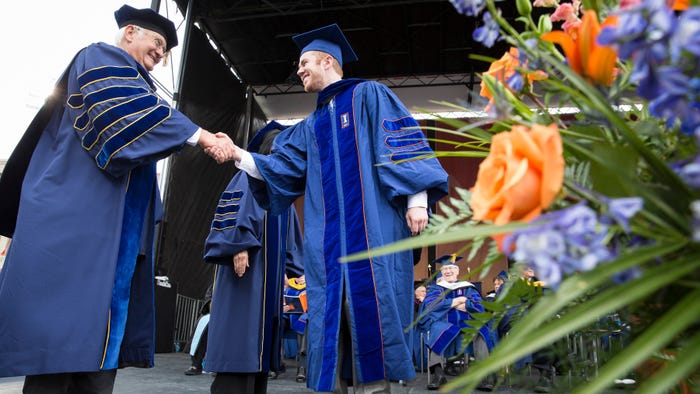
LEADER: Integrity, fairness and strength are what people most often associate with Bob Easter, who served as president of the University of Illinois from 2012 to 2015.
His longtime friend and colleague Ed McMillan says if you look up “servant-leader” in Wikipedia, Bob Easter’s picture is there. “He’s just so unassuming. Not assertive, not pushing himself into things,” says McMillan, who served as chair of the U of I board of trustees during Bob’s tenure of leadership. “And yet he’s recognized globally for his leadership, knowledge and experience. He’s a well-known swine nutritionist in the world.”
Unassuming, indeed. Bob tells of the day in 2012 when he got the call to come back as U of I president, a full year into his second attempt at retirement.
“Chris Kennedy [board chairman] began the call by saying, ‘Hey, Bob, what are you doing?’ I said, ‘Well, I’m in the middle of a field picking up rocks.’ Because I was — my wife, Cheryl, and I were picking rocks out of a waterway for our daughter’s rock pit. There was a long pause, and he had to wonder if he was asking the right guy.”
But he was. And Bob spent the next three years as president, quietly asserting agriculture to a prominent position in the university system.
A scientist at heart, Bob remains focused on the future. He follows U of I research that’s increased photosynthesis by 30% and believes meat alternatives will continue to surface, but that humans will always source protein from animals. “The reality is that in a lot of the world, they can’t grow anything but grass. The way to harvest that is with animals,” he says.
Today, Bob is mostly retired, for the third time. He holds the title of emeritus president and emeritus professor and has a perfectly quiet office on campus.
He speaks to the occasional class and has returned directly to his agricultural roots — both literally in the garden and as a consultant on various ag-related boards. He and Cheryl stay busy with two children and six grandchildren, and in their church.
In the end, McMillan says it best: “He’s a quiet visionary who got things done.”
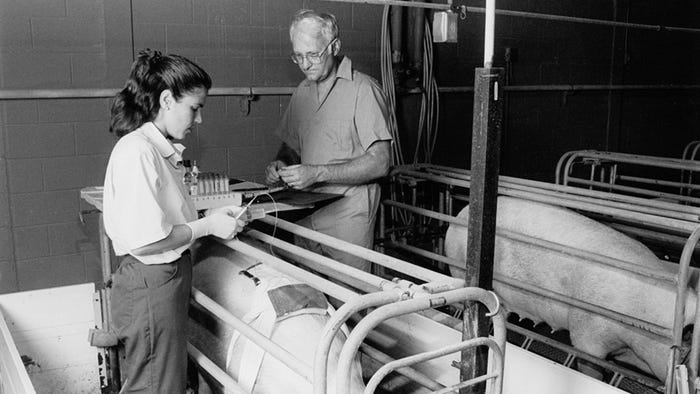
TEACHER: Bob Easter and graduate student Nathalie Trottier studied blood factors that regulate feed intake in sows during the 1990s. (Photo courtesy of Robert Easter)
A career by the years
1966: graduated high school
1968: finished community college
1970:graduated Texas A&M in ag education
1972: earned master’s in animal nutrition and served three months in the Army, followed by 20 years as a Reserve officer
1973:came to U of I as doctoral candidate
1976: earned doctorate
Late ’80s: became full professor at U of I
1996: became head of animal sciences
2001: named interim College of ACES dean
2002: named ACES dean
2009: retired (first time)
May 2009: named interim provost
Fall 2009: named interim chancellor
2011: retired (second time)
2012: named president
2015: retired (third and final time)
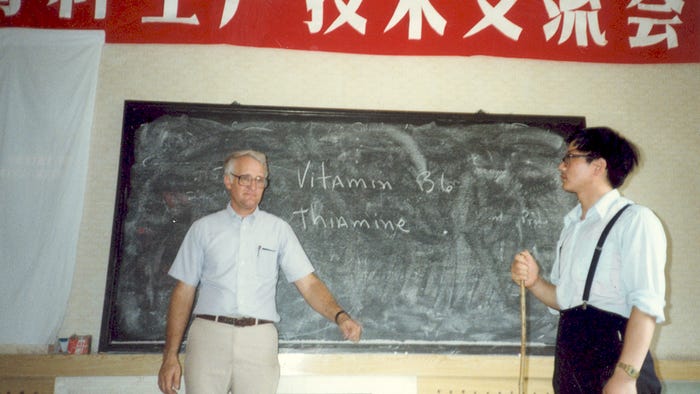
GLOBAL AUTHORITY: Bob Easter has traveled overseas as many as 75 times, including this trip to present research on swine feed in China. “It was before PowerPoint,” he jokes. (Photo courtesy of Robert Easter)
Bob’s favorites
Bob Easter
Job? Dean of University of Illinois College of Agricultural, Consumer and Environmental Sciences
Tractor? John Deere
Livestock? Pigs. We had Durocs and Polands growing up.
Team? Illinois, of course
Place to be? Sitting in my sunroom, looking out at spring
Book? The two-volume series by Michael Burlingame, “Abraham Lincoln: A Life”
Family? Wife Cheryl, two children, six grandchildren
Advice? Keep an even keel. The sun will come up tomorrow. Keep on going.
About the Author(s)
You May Also Like






